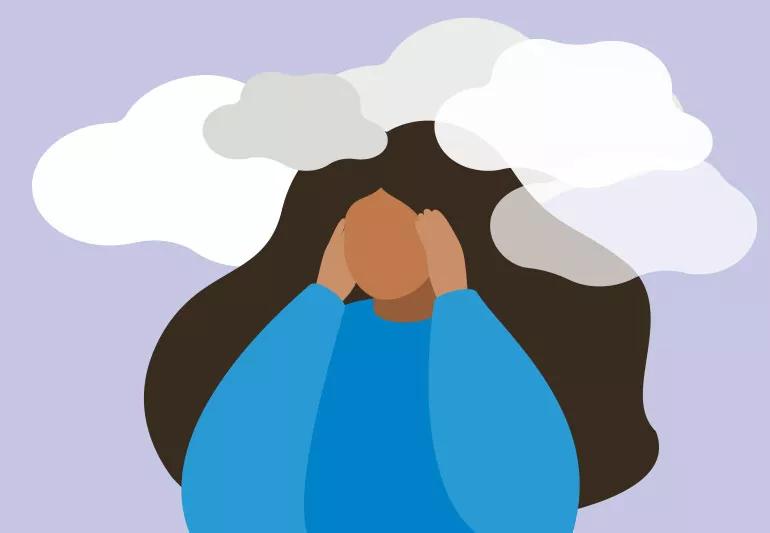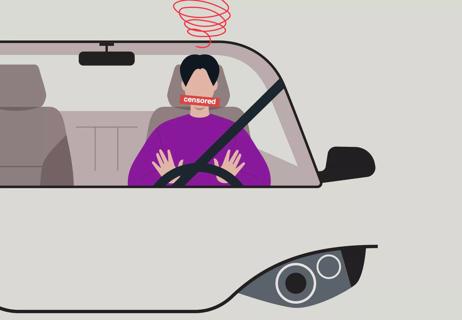Brain fog has many symptoms and many possible underlying conditions

Have you ever just lost your train of thought while you’re in the middle of an activity? Or maybe you’re caught up in conversation when suddenly you have trouble remembering that darn word or detail that just slipped out of reach. These events are common as you get older. But if your thinking has been affected suddenly and gradually worsens so you have difficulty focusing or putting your thoughts into words, you may be experiencing what people call brain fog.
Advertisement
Cleveland Clinic is a non-profit academic medical center. Advertising on our site helps support our mission. We do not endorse non-Cleveland Clinic products or services. Policy
Neuropsychologist Kamini Krishnan, PhD, explains why brain fog has become a popular term of the moment and why brain fog may happen as a symptom of other common conditions.
Brain fog doesn’t have a single official definition or medical diagnosis. Instead, it’s often a cluster of cognitive symptoms that people experience. Brain fog can be a lot of things to different people, too. It can include any or all of the following:
“When you have deficits in these areas, you may feel like you’re having memory problems. But it’s more of a problem in acquiring and maintaining the right information,” says Dr. Krishnan. “If you’re not getting the right information, you can’t be expected to hold onto it.”
So, what’s causing the blockage of information? Well, there’s no definitive answer. One idea is that your body’s immune system response could cause inflammation in your brain. When inflammation occurs, this could cause a temporary blockage in processing information. Brain fog can also be caused by chronic stress, hormonal changes or blood sugar imbalances.
Advertisement
“Brain fog is a sort of manifestation of some type of inflammation or chronic stress response,” explains Dr. Krishnan. “Chronic stress can have secondary effects. It impacts your sleep, your nutrition and your physical ability. Those secondary issues can lead to or be associated with psychiatric disorders.”
Here are some common conditions associated with brain fog symptoms.
You experience a range of hormonal changes during each trimester. When these hormonal changes occur, your brain tries to restore balance by releasing and suppressing certain hormones to level everything out. You may experience brain fog because of this constant flux of hormones or because of other stressors that can occur even early in your pregnancy.
“In your first trimester, you may have more nausea, poor nutrition, insomnia or lack of sleep, or other increased stressors for a variety of reasons. All of these things can manifest as brain fog,” says Dr. Krishnan.
Brain fog has been getting its 15 minutes of fame thanks to COVID-19 and all its related symptoms. In fact, brain fog is one of the top three symptoms often listed by long-haulers, who experience prolonged symptoms or delayed symptoms weeks and sometimes months after initial infection.
“People who have been in the ICU or required more severe forms of treatment tend to experience more brain fog,” notes Dr. Krishnan.
The trouble, Dr. Krishnan points out, is that long-haulers and people who’ve recovered from COVID-19 often also experience other symptoms that can lead to brain fog. This includes trouble sleeping, increased stress or mood levels, or a significant change in their diet or nutrition.
“All of these factors can also contribute to brain fog,” he says.
So, it’s difficult to pinpoint exactly what’s causing the brain fog — COVID-19 or these other closely related symptoms. One major hypothesis is that brain fog related to COVID-19 may actually be a result of having a cytokine storm (also known as cytokine release syndrome).
In a cytokine storm, your body floods your bloodstream with inflammatory proteins called cytokines. These cytokines help target the virus, or foreign body, that’s causing trouble. But this can also trigger an exaggerated immune system response in other areas of your body, like your brain, and lead to further inflammation.
“While it’s trying to be protective, it can also have negative effects,” says Dr. Krishnan.
Depression and its relation to brain fog is kind of like asking what came first, the chicken or the egg? One can often lead to the other and vice versa. One common reason for this may be because of neuroinflammation caused by the constant activation of your hypothalamus pituitary adrenal pathway.
Advertisement
“That’s your body’s fight-or-flight response,” explains Dr. Krishnan. “If your body is in a constant level of activation, it can have negative side effects and present as depression or anxiety because it has that inflammatory response.”
Brain fog associated with depression or anxiety often feels like constant fatigue or a general sense of malaise.
The same cytokine storm that’s present in some people with COVID-19 can also occur as a result of chemotherapy. Unlike with COVID-19, though, brain fog that’s associated with chemotherapy treatments often goes away in a much shorter time.
“Sometimes, brain fog or cognitive complaints don’t show up until a few years after the start of chemotherapy,” says Dr. Krishnan. “We don’t anticipate this to be a long-term issue. Most people say it gets better as time progresses from the chemotherapy treatments.”
Some food sensitivities can also lead to brain fog or its associated inflammatory response. For example, with celiac disease, people will often complain of feeling cloudy or bogged down because of their gluten sensitivity.
If you have low blood sugar (hypoglycemia), you can feel dizzy, lightheaded, foggy or nervous and unable to concentrate. This is especially true in people with diabetes if their body creates too much insulin. Sometimes, you can even experience low blood sugar levels after having a meal.
Advertisement
Several autoimmune conditions are also associated with brain fog, including:
“A prolonged attack on the immune system tends to have an impact on an individual’s brain function,” notes Dr. Krishnan.
In general, there aren’t any known medications or treatments that correct brain fog directly. To immediately address most chronic stressors, Dr. Krishnan suggests focusing on improving your sleep, getting good nutrition and exercising 30 minutes every day, five days a week. These small changes to your everyday life can build up over time and greatly impact your immune system response and reduce inflammation.
“This doesn’t have to be a marathon,” says Dr. Krishnan. “The idea is to challenge yourself every day and reduce any stressors as much as possible in your life.”
Dr. Krishnan also suggests taking mental breaks throughout the day to build up your mental capacity.
“Most of us tend to go, go, go until you hit a point of no return and then you’re fatigued or tired or unable to do things for a day or two,” Dr. Krishnan adds. “We recommend people take 20- to 30-minute breaks even before they’re tired by doing some kind of focused activity like walking, listening to music or closing your eyes and resting.”
Advertisement
If you’ve tried these methods, or you’ve experienced brain fog for some time, you should call your healthcare provider or work with an integrative medicine specialist who can help you make lifestyle changes across several areas that include diet, nutrition, sleep and exercise.

Sign up for our Health Essentials emails for expert guidance on nutrition, fitness, sleep, skin care and more.
Learn more about our editorial process.
Advertisement

Cognitive distortions are ‘thought traps’ that keep you from objectively interpreting your thoughts

These intrusive thoughts are common and fleeting, and aren’t often a cause for concern, unless you have other mental health symptoms

Grounding techniques, cognitive defusion and various types of talk therapy can all help

These unwanted thoughts, images or urges are often violent, disturbing and not aligned with your values — but they don’t mean you want to act on them

Inductive and deductive reasoning are thought patterns your brains uses to help you make decisions

Foul language may be beneficial, but it won’t make you smarter

Strokes affect your brain, while heart attacks affect your heart — both can be life-threatening emergencies

Options for your changing mobility range from small swaps to major renovations

Even small moments of time outdoors can help reduce stress, boost mood and restore a sense of calm

A correct prescription helps your eyes see clearly — but as natural changes occur, you may need stronger or different eyeglasses

Both are medical emergencies, but they are very distinct events with different causes